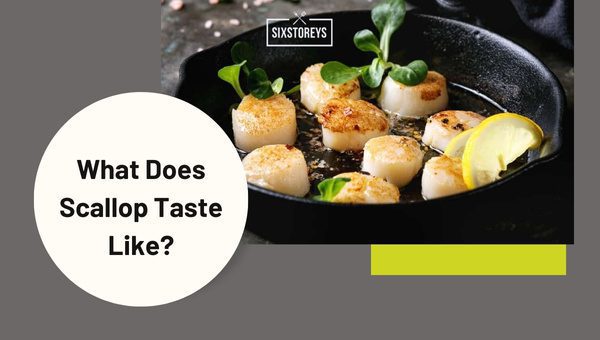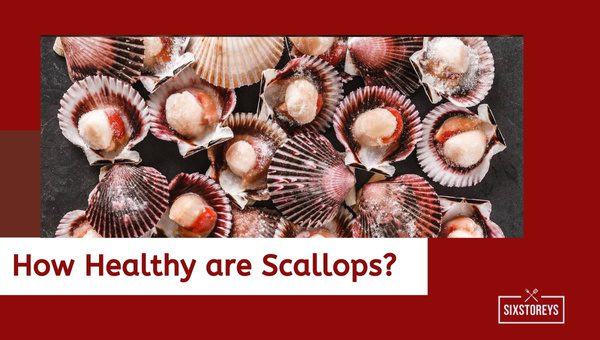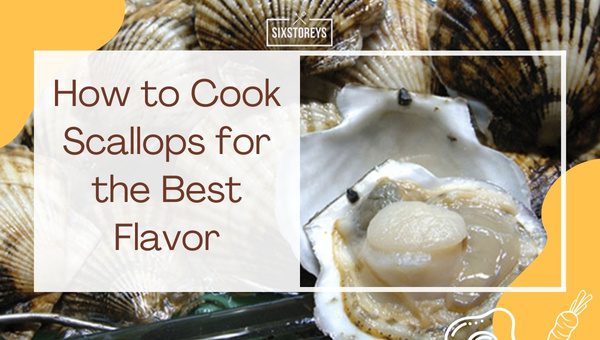What Does Scallop Taste Like? Seafood Lovers Must Know
Let's embark on a culinary adventure and delve deep into the realm of seafood, specifically focusing on a gourmet delight often gracing the plates at high-end restaurants - the scallop. Now, you might ask, "what does scallop taste like?" I bet you've seen scallops on cooking shows, or even in your local grocery store, and wondered how this tantalizing treasure from the ocean fares on the taste-buds.
Well, describing the flavor of scallops is a fascinating journey, a bit like threading a taste-tapestry. They are often hailed as the candy of the sea, and for good reason. But this is only the beginning of our flavorful expedition. Stick around, and I'll provide you with an overview of the succulent taste, unique texture, and wonderful nuances of this beloved seafood favorite, the scallop. Let's delve into what makes scallops a gastronomic darling in both the amateur and professional kitchen.
Also Read: What Does Fennel Taste Like?
Article Includes
What Does Scallop Taste Like?

Envision biting into a soft, slightly chewy treat that exudes a sublime sweetness with a hint of the ocean's freshness. That, my friends, is precisely how a scallop tastes. To elaborate further:
Sweet and Mild
Scallops have an incredibly sweet and mild flavor that appeals to both seafood lovers and those who typically steer clear of oceanic fare. Their light, unimposing taste makes them the perfect canvas to take on the flavors of other ingredients, making them a versatile ingredient in many dishes.
Delightful Texture
When it comes to texture, scallops are unique. Whether pan-seared, grilled, or baked, they have a delicate, almost buttery texture that is soft without being mushy. When cooked correctly, they offer a slight resistance, followed by a melt-in-your-mouth experience that is unlike many other types of seafood.
A Hint of the Sea
Although scallops are sweet, they still possess a gentle briny flavor. Imagine a warm, salty breeze coming off the ocean; now think of that encapsulated in a taste. However, don't thinkbucket of seawater. The hint of the sea in a scallop's flavor is subtler and adds a freshness that sets it apart from many other kinds of seafood.
Preparation Affects Flavor
It's crucial to remember that the preparation method heavily influences the taste of scallops. Techniques like searing or grilling caramelize the outer surface, lending a rich, umami flavor to the finished dish. Conversely, raw or lightly cooked scallops used in sushi or ceviche showcase the scallop's natural sweetness.
Knowing how scallops taste can enhance your appreciation for them and even inspire new culinary adventures. And one might even say that exploring the scallop’s distinctive flavors is a gustatory journey well worth taking.
The Science behind the Unique Taste and Texture of Scallops
There's an intriguing science that goes into the unique taste and texture of the scallop. Broadly, scallops draw their flavor primarily from proteins and minerals found within their tissues, as well as from their diet - which is typically phytoplankton. Their taste is often described as a delicate balance between sweet and salty with a hint of umami, the so-called fifth taste that signifies savoriness.
When it comes to texture, scallops are primarily muscle and thus have a firm, yet tender bite when cooked right. The majority of a scallop's mass consists of the "adductor" muscle, making them meatier and less flaky compared to other seafood delicacies. The simplicity in taste allows scallops to absorb other flavors easily, making them a versatile ingredient in the kitchen.
Contrary to most seafood, scallops have a low iodine content, so they lack a "fishy" taste, presenting a more pleasant and palatable profile as a result.
How Healthy are Scallops?

Moving on to the all-important health segment of our discussion - just how healthy are scallops? I'm happy to report that not only are scallops a delight to your taste buds, they're also a boon to your health!
Scallops are an excellent source of lean protein, with a 3-ounce serving providing 20 grams. They are low in calories and fat, making them a perfect fit for health-conscious individuals. They're packed with several essential nutrients as well.
Here's a brief rundown of some of the nutrients found in scallops:
- Vitamin B12: An essential nutrient for nerve function, DNA production and red blood cell development.
- Omega-3 Fatty Acids: Heart-healthy fats that can reduce inflammation and lower heart disease risk.
- Selenium: An antioxidant that helps protect your body from damaging free radicals.
- Phosphorus and Calcium: Essential minerals for strong, healthy bones.
- Zinc: Boosts the immune system and helps in wound healing.
Not to be outdone by their stellar nutrient content, scallops are also low in mercury, unlike many other seafood varieties. This means you can enjoy scallops regularly without the risk of mercury exposure, making them a healthier and safer seafood choice.
Scallops offer a unique blend of mouth-watering taste and impressive health benefits, making them a welcome addition to any balanced diet.
Tips for Selecting Fresh Scallops
Choosing high-quality fresh scallops is indeed the first step in your endeavor to prepare a delightful scallop dish. Incorporate these pointers while you're out scallop shopping:
- Smell: Fresh scallops should have a clean, sweet, and somewhat oceanic scent. Avoid those with an overly fishy or sour smell as they could be past their prime.
- Color: The color of scallops varies from creamy white to a pale orange. Unusually bright or bleached scallops may have been treated with chemicals to extend their shelf life, so give them a wide berth.
- Feel: Fresh scallops should feel luxuriously firm to the touch. If they are too soft or start disintegrating, those are not fresh.
- Visual: Wet-packed scallops soak in water and phosphates to prolong their shelf life so they'll appear uniformly white and plump. On the other hand, dry-packed scallops retain their natural color and are considered more flavorsome.
Keeping these tips in your culinary toolkit can ensure that your scallop dishes are infused with maximum freshness and top-notch quality.
How to Cook Scallops for the Best Flavor?

Getting the best flavor out of your scallops begins with their preparation and extends to the cooking process. Here are some essentials to remember:
Step 1: Preparing Scallops
- Rinse your scallops under cold water to remove any residual grit.
- Pat dry them meticulously to draw out excess moisture.
Note: Wet scallops might not sear properly, as they'll end up steaming in their juices instead.
Step 2: Cooking Scallops
Scallops can be grilled, broiled, baked, or sautéed. Still, one of the best ways to draw out their optimal flavor is by searing them. Here are my special tips for delicious, mouthwatering seared scallops:
- Preheat your pan: Heating your pan before adding oil prevents the scallops from sticking to the pan and also fosters a delightful sear.
- Avoid overcrowding the pan: Place the scallops in a way that they've enough room. Overcrowding leads to steam, not sear.
- The right duration: Sear each side for about 1.5 to 2 minutes to achieve good coloring without overcooking them.
Step 3: Spruce Up Your Scallops
For a pop of flavor, try adding garlic, butter, lemon zest, or parsley once the scallops are done. Scallop dishes are popularly paired with pasta, risotto, and salads.
Pairing Scallops with Other Foods for the Ultimate Dining Experience
To truly enjoy your scallop dish, a thoughtful pairing with other foods makes the dining experience even more memorable. From crisp green salads to comforting pasta dishes and the perfect wine accompaniment, it's all about complementing the natural tastes and textures in scallops.
Crunchy Greens
A fresh and vibrant garden salad or roasted green veggies are perfect partners to the natural sweet and slightly briny flavor of scallops. Some commonly preferred greens include roasted Brussels sprouts, asparagus, or even a simple mixed leaf salad.
Hearty Grains or Pasta
Scallops also pair well with bold, hearty grains like quinoa or barley. These grains offer a filling contrast to the light, delicate nature of scallops. A creamy and comforting pasta dish also provides a delightful contrast to scallops. Try pairing scallops with a nicely-cooked comforting fettuccine alfredo. It's magic on a plate, I promise!
Sauces: Boosting Flavor Profiles
A light citrusy or buttery sauce is great for enhancing scallops' taste without overshadowing it. Whether it's a classic butter and garlic-based sauce like the Beurre Blanc, or something exotic like a pineapple salsa, the sauce can truly transform your scallop dish.
Wines: Elevate Your Taste Experience
Pair your scallops with a glass of perfectly chilled white wine, and you've got a match made in heaven. White wines - particularly Chardonnay, Pinot Grigio, or even a zesty Sauvignon Blanc - accentuate the natural sweetness of scallops.
Also Read: What Does Kimchi Taste Like?
Frequently Asked Questions
Where do scallops come from?
Scallops are harvested from oceans all over the world. The most popular varieties in the United States often come from the Atlantic Ocean or the Pacific Ocean.
Are scallops safe to eat raw?
While scallops can technically be eaten raw, it's recommended that people with a weak immune system or pregnant women should avoid doing so due to the risk of foodborne illnesses. Consuming raw scallops in a sushi restaurant or other reputable establishment minimizes this risk.
Are there different types of scallops?
Yes, there are several species of scallops, but the most commonly eaten one are sea scallops and bay scallops. Sea scallops are larger and often found in fine dining restaurants, while bay scallops are smaller and sweeter.
Do scallops have any health benefits?
Absolutely, scallops are rich in protein, vitamins, and minerals like zinc and selenium, making them a very healthy food option.
Can I eat scallops if I'm allergic to shellfish?
No, if you're allergic to shellfish, you should avoid eating scallops as they may trigger an allergic reaction.
Is it challenging to cook scallops at home?
Not at all. While it can be a little intimidating if you're unfamiliar, cooking scallops is generally quick and easy. The key is not to overcook them, as they can quickly become tough and lose their unique flavor.
How do I know if scallops are cooked properly?
Scallops are done cooking when they turn opaque, and the edges are firm. The center should still be somewhat translucent and tender.
What wine pairs well with scallops?
Typically, a crisp white wine like Chardonnay, Sauvignon Blanc, or a dry Riesling partners beautifully with scallops due to its bright acidity, which provides a delightful contrast to the sweet and tender scallops.
What are some side dishes that go well with scallops?
Scallops pair excellently with light and fresh side dishes. This could be vegetables like asparagus or peas, or grains like pasta or quinoa. They also go well with a variety of sauces, from tangy citrus-based ones to creamy white wine sauces.
Conclusion
Savoring the delicate taste of scallops is truly an experience worth immersing yourself in. Their unique flavor profile that falls somewhere between crab and lobster yet retains a character all of its own, their buttery texture that almost melts in your mouth, crafted by careful preparation, is something food lovers ought to indulge in. Whether you're a seafood fanatic or a curious food explorer, this oceanic gem is likely to leave you craving more.
Through the journey we've taken together, you've gained an understanding of not just what scallops taste like, but also the tips you need to select, cook, and savor them — amplifying your dining experience to exceptional heights. Although my words have striven to illuminate the symphony of flavors that this seafood marvel embodies, remember, the real magic lies in tasting. The next time you come across scallops on a menu or at your local grocery store, don't be hesitant — give them a try! You just might discover your new favorite delicacy.

